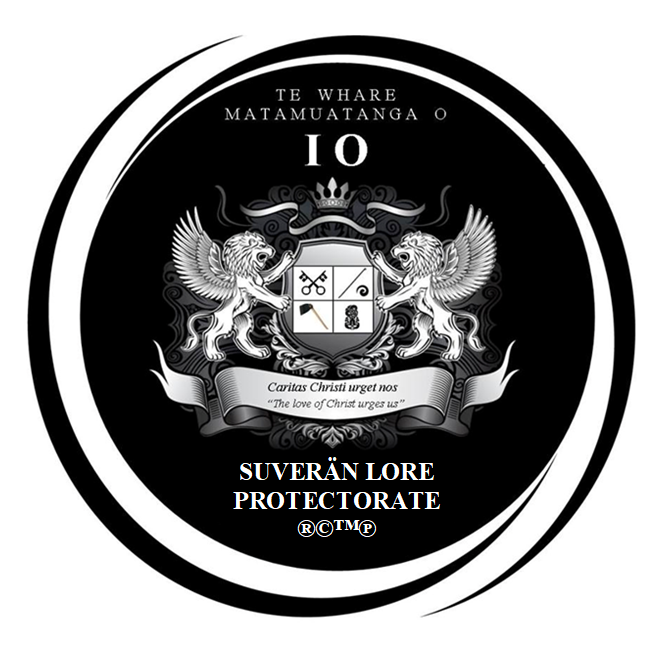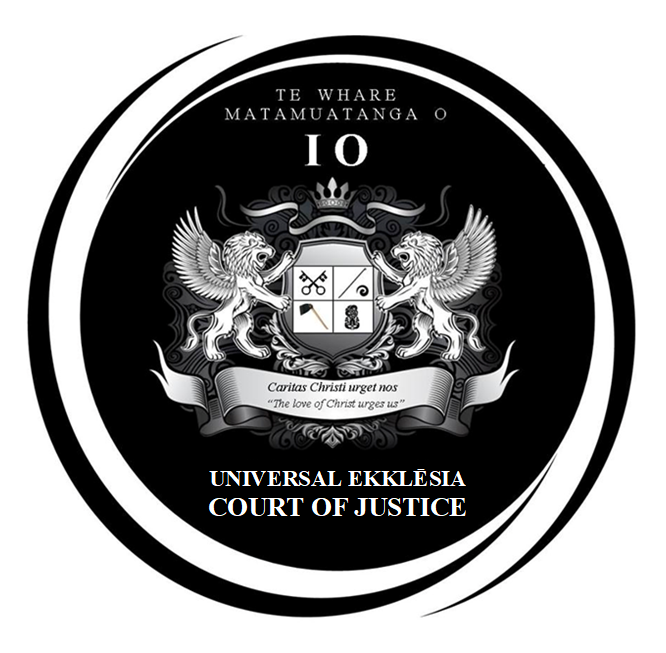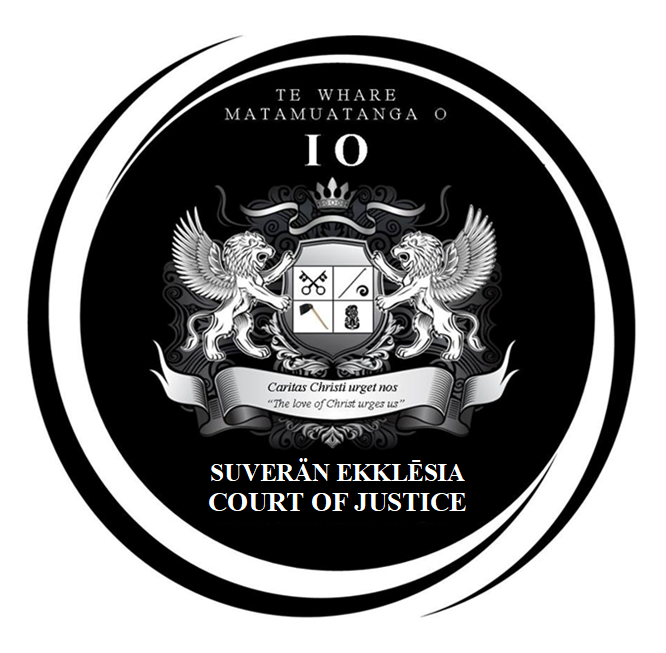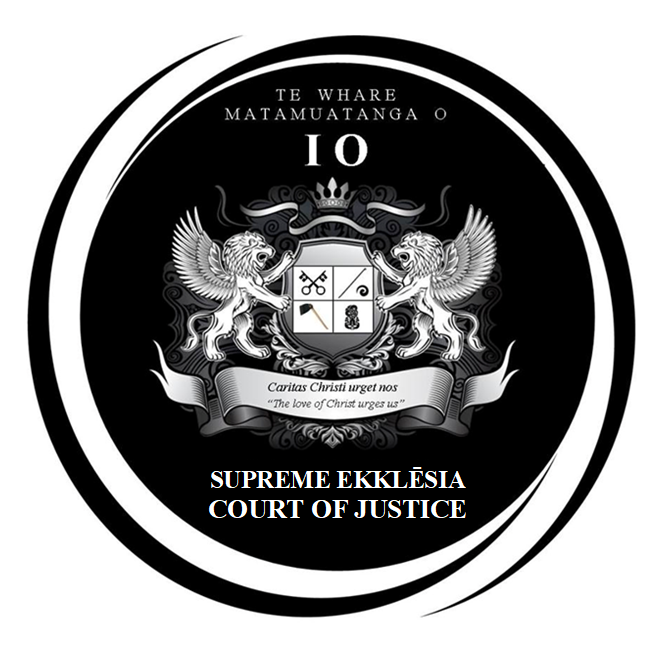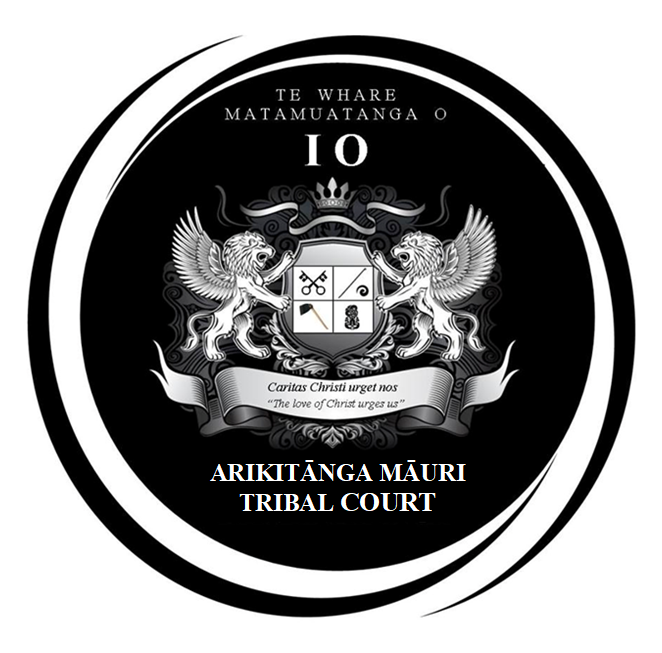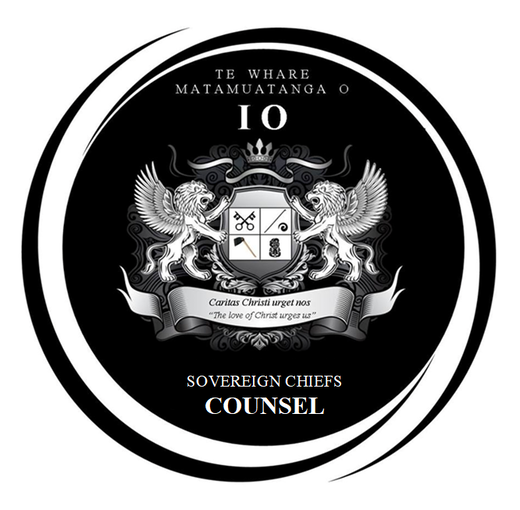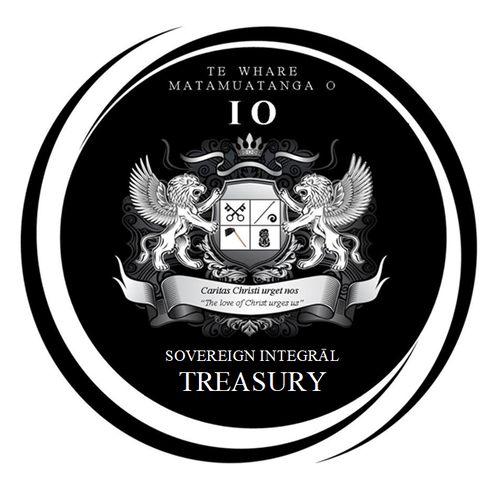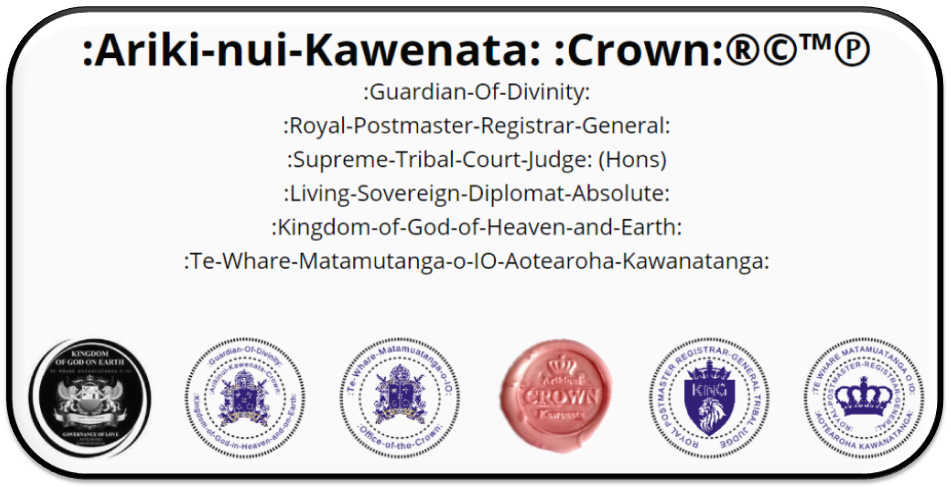-
HOME
- JOIN
- GUARDIANS
- IT'S TIME
-
GOVERNANCE OF LOVE
- THE WAY HOME OR FACE THE FIRE
- AOTEAROHA KAWANATANGA
- NON-AGGRESSION PEACE TREATY >
- THE TRIUNE SPIRIT >
- THEOCRACY STRUCTURE >
-
GOD'S BANK RESERVES
>
-
REVELATION OF CHRIST
>
- MARK OF THE BEAST
- MAN'S GOVERNMENT IS SATAN'S RELIGION
- EARTH CONSTITUTION
- EARTH FEDERATION PLEDGE OF ALLEGIANCE
- WORLD CONSTITUTION & PARLIAMENT ASSOCIATION
- ABOUT WORLD PARLIAMENT?
- HOW WORLD GOVERNMENT WORKS?
- FOUNDATIONAL PRINCIPLES OF THE MOVEMENT
- CONCEPTUAL MODEL OF THE EARTH FEDERATION
- POLITICAL LEGITIMACY
- EMERGENCY EARTH RESCUE ADMINISTRATION
- A BILL OF PARTICULARS
- PREAMBLE & ROYAL CHARTER >
- ROYAL ANNOUNCEMENT DECLARATION AND DECREE 31 MAY 2020 PENTECOST >
- LETTERS PATENT 2019
- KINGDOM BLUEPRINT >
- PROCLAMATION
- COMMON LAW COURT DECLARATION
-
OUR STRUCTURE
- MAORI AUTHORITIES >
- NON GOVT FOUNDATIONS >
- CITIES OF THE FUTURE >
-
PEACE & JUSTICE
>
- HUMANITARIAN PROJECTS >
-
CHURCH & MARAE
>
- BAPTISMS, ANOINTMENTS & BDM >
- CONSCIOUS COMMUNITIES >
- CAREERS & MANPOWER VOLUNTEERS >
- HOLISTIC HEALTH >
- TRAVEL & TRANSPORT >
- SECURITY & WARDENS
- IDEAS & INNOVATION >
- TRUE POTENTIAL SCHOOLS >
- LAND & HOUSING >
- FOOD & WATER >
- COMMUNICATIONS >
- AGRI-AQUA-HORTI-CULTURE >
- MOTHER EARTH >
- OFFICE OF THE CROWN
-
NZ GOVERNMENT
- ACTION PLAN >
- OUR PUBLIC SERVICES
- STRONG REGIONS AND PRIMARY INDUSTRY
- EDUCATION >
- HEALTH >
- MORTGAGE REDUCTION & HOUSING
- SOCIAL DEVELOPMENT
- ETHNICITY
- MAORI DEVELOPMENT >
- PACIFIC AFFAIRS
- COMMUNITY SAFETY
- JOBS AND INNOVATION >
- CLEAN RIVERS
- PROTECTING OUR ENVIRONMENT >
- TOURISM AND CONSERVATION
- SPORTS AND RECREATION
- OUR RAINBOW POLICY
- VISION FOR CANTERBURY
- GET INVOLVED
- NEWS & UPDATES
- WORLD PUBLIC GAZETTE
- THE GLOBAL FAMILY GROUP
-
KINGDOM PROJECTS
- KINGDOM INFRASTRUCTURE
- DIPLOMATIC IMMUNITY
- DOCUMENTS OF IMPORTANCE
- LORE PROTECTORATE
- COMMON LAW ENFORCEMENT
- SECURED PARTY
- CROWN CORPORATION DECEPTION
- Q ARRESTS AND EXECUTIONS
- THE FAMILY
- SYNDICATE HOUSING
- HEALTHCARE AND WELFARE
- PERSONAL DEVELOPMENT
- UNVEILING APOCALYPTIC TRUTH
- UNVEILING THE TRUTH
- BILLION $ DIAMOND
- MEMBERSHIP OBLIGATIONS
Disclosure & Disclaimer:
It is important to inner-stand that our divine Suverän (Souverain) LORE Protectorate of Peace Keepers and our Ekklēsia Courts of Justice and Tribal Counsel, are part of our own cooperative mahi-tahi establishment that is the protectorate ONLY, for Te Whare Mātāmuatanga o IO - Aotearoha Kāwanatanga, also known as "The Kingdom House of IO" - "The World of Love Governance" and any Alliances registered to our un-incorporated global society.
Our Ekklēsia LORE comes from the divine commandments, written in stone by the very hand of Creator, IO Supreme, Almighty God, Most High. WE pledge to be Guardians Of Divinity, protecting the living essence and Sentinel-beings within. WE are a peaceful Nation and Conscience Conscious Community of members around the World. WE serve only ONE Master in LORE that is superior (supreme) to fictitious man-made draconian Roman color of LAW.
Legislation, Statutes or Acts are unlawful and do NOT apply HERE. Policy enforcers and pirate corporations, including governments, are NOT Sovereign/Souverain to Land, Air, Water or Space and requires the consent to contract in commerce by WE THE PEOPLE of the LAND (Tangata wenua o te Whenua). A corporation in corpus juris, does NOT have jurisdiction over any member of our Global Society. WE are born in rite to defend our E-State Suverän (Souverain) Nation in our own sui juris authority given to us by God IO Supreme. WE proclaim that WE have returned to the Divine LORE of Natural Creation of Supreme Source of all natural-living things and WE REJECT and REBUKE Dead-entity Corporations, under the LAW of DEAD fictitious PERSONS.
Our Ekklēsia LORE comes from the divine commandments, written in stone by the very hand of Creator, IO Supreme, Almighty God, Most High. WE pledge to be Guardians Of Divinity, protecting the living essence and Sentinel-beings within. WE are a peaceful Nation and Conscience Conscious Community of members around the World. WE serve only ONE Master in LORE that is superior (supreme) to fictitious man-made draconian Roman color of LAW.
Legislation, Statutes or Acts are unlawful and do NOT apply HERE. Policy enforcers and pirate corporations, including governments, are NOT Sovereign/Souverain to Land, Air, Water or Space and requires the consent to contract in commerce by WE THE PEOPLE of the LAND (Tangata wenua o te Whenua). A corporation in corpus juris, does NOT have jurisdiction over any member of our Global Society. WE are born in rite to defend our E-State Suverän (Souverain) Nation in our own sui juris authority given to us by God IO Supreme. WE proclaim that WE have returned to the Divine LORE of Natural Creation of Supreme Source of all natural-living things and WE REJECT and REBUKE Dead-entity Corporations, under the LAW of DEAD fictitious PERSONS.
KING of Kings Bible
MATTHEW
7:21 Not every one that saith unto me, Lord, Lord, shall enter into The Kingdom of heaven; ONLY he that doeth the Will of my Father which is in heaven.
7:22 Many will say to me in That Day, Lord, Lord, have we not prophesied in thy name? and in thy name have cast out devils? and in thy name done many wonderful works?
7:23 And then will I profess unto them, I never knew you: depart from me, ye that work inequity.
7:21 Not every one that saith unto me, Lord, Lord, shall enter into The Kingdom of heaven; ONLY he that doeth the Will of my Father which is in heaven.
7:22 Many will say to me in That Day, Lord, Lord, have we not prophesied in thy name? and in thy name have cast out devils? and in thy name done many wonderful works?
7:23 And then will I profess unto them, I never knew you: depart from me, ye that work inequity.
LAW is lawlessness to the LORE of Father, Almighty Most High. LAW is man-made colour of law. Draconian Roman Military & Federal Law for Commerce and Trade. Money of Mammon (Industry) and the god of fools gold. Contract law of fictitious policy enforcement. Statutes, Acts & Legislation is unlawful. It is fictitious FRAUD and a LIE.
Return to the Restorative Justice of the LORE of Love and STOP practicing Land, Air, Water, Army, Airforce, Navy Maritime Admiralty LAW of Retribution, incarceration and punishment. If you stand under LAW, then you do not inner-stand the LORE of Love and you are not of IO Supreme, Father Almighty Most High. The gold-light spirit of energy exchange, "Do No Harm" LORE of Love is IO Supreme.
JOIN the Alliance TODAY!
Return to the Restorative Justice of the LORE of Love and STOP practicing Land, Air, Water, Army, Airforce, Navy Maritime Admiralty LAW of Retribution, incarceration and punishment. If you stand under LAW, then you do not inner-stand the LORE of Love and you are not of IO Supreme, Father Almighty Most High. The gold-light spirit of energy exchange, "Do No Harm" LORE of Love is IO Supreme.
JOIN the Alliance TODAY!
|
|
|
The Ekklēsia Courts of Heaven
TRIUNE LORE OF LOVE
(RESTORATIVE JUSTICE)
(RESTORATIVE JUSTICE)
Restorative Justice verses Retributive Justice
Restorative justice aims to restore and rehabilitate offenders and reconcile them with their victims and with the affected community. In contrast to restorative justice is retributive justice, which aims to punish wrongdoers according to what they deserve without the goal of restoration. In retributive justice, individuals reap what they sow. Both forms of justice are present in Scripture, though the theme of restorative justice is more prominent.
To understand what the Bible says about restorative justice, it is helpful to recognize the theme of retributive justice in Scripture. The Bible says that sin has consequences and that poor decisions often lead to negative outcomes (Isaiah 59:2; Proverbs 1:32). These themes of retribution and measured punishment for the guilty are present throughout the Old Testament legal system and sprinkled throughout the New Testament (Deuteronomy 19:21; Ecclesiastes 11:4; Galatians 6:7–8). It is also important to note that God assigns governmental authorities the role of punishing evil (Romans 12:19—13:5). Being just, God does not leave evil unchecked. Pagans and Christians alike face consequences for their sin. Scripture makes it clear that there is value in punishing wrongdoing, but, ultimately, justice is God’s to mete out (Romans 12:17–21; 1 Peter 2:21–23).
To some degree, there are retributive themes in Genesis 3. Adam and Eve disobey God and suffer the consequences of sin. However, Christ took our deserved punishment upon Himself with the purpose of full redemption (see Isaiah 53:5 and Hebrews 9:12). It is God’s grace that adds to the story of retributive justice. God’s gift of redemption, restoration, and forgiveness for undeserving sinners permeates Scripture (Isaiah 32:17; Psalm 111:9; 130:8; John 3:16; Acts 3:19; Colossians 1:19–23). The goal of restorative justice in Scripture is the full restoration of the relationship between God and sinful humans.
We see an example of a redemptive approach in Jesus’ Sermon on the Mount. The Lord says, “You have heard that it was said, ‘An eye for an eye and a tooth for a tooth.’ But I say to you, do not resist the one who is evil. But if anyone slaps you on the right cheek, turn to him the other also. . . . You have heard that it was said, ‘You shall love your neighbor and hate your enemy.’ But I tell you: Love your enemies and pray for those who persecute you” (Matthew 5:38–39, 43–44). In these verses, Jesus emphasizes the importance of restoring relationships between parties rather than repaying wrongdoing. While He does not negate the importance of government fulfilling its duty to punish wrongdoing, He teaches that our hearts should have a posture of forgiveness and reconciliation.
A clear example of restorative justice in Scripture comes from the book of Philemon. Philemon’s slave, Onesimus, escapes and flees from his master. In those days, masters had the right to sentence their runaway slaves to execution. Making an effort to reconcile with one’s master was unthinkable. However, through the influence of Paul, the runaway Onesimus places his trust in Christ. Paul then pens a letter to his close friend Philemon, asking him to welcome Onesimus home. Rather than seeking the punishment Onesimus deserves, Paul seeks to restore the relationship between slave and master. He goes even further, telling Philemon to receive Onesimus “no longer as a slave, but . . . as a dear brother” (Philemon 1:16). Paul then offered to pay Philemon any damages incurred: “If he has wronged you at all, or owes you anything, charge that to my account” (Philemon 1:18). The theme of restorative justice in this story points toward the gospel.
We see restorative justice in the gospel through Jesus’ death on our behalf. Our sins deserve punishment, but Jesus took our punishment on Himself in order to save us from the consequences of sin and to restore us to a right relationship with God. One day restorative justice will be fully realized. When Christ returns He will restore relationships, bodies, and even the earth (John 5:24–25; Romans 6:5–7; Revelation 21:25).
It is a great act of grace that God chooses a balance of restorative justice and retributive justice for sinners. Out of gratitude and obedience, believers should also choose restoration, redemption, and forgiveness in their relationships (Ephesians 4:31–32).
In summary, restorative justice is paramount to the overarching story of Scripture. Without it, there is no right relationship between God and sinners.
To understand what the Bible says about restorative justice, it is helpful to recognize the theme of retributive justice in Scripture. The Bible says that sin has consequences and that poor decisions often lead to negative outcomes (Isaiah 59:2; Proverbs 1:32). These themes of retribution and measured punishment for the guilty are present throughout the Old Testament legal system and sprinkled throughout the New Testament (Deuteronomy 19:21; Ecclesiastes 11:4; Galatians 6:7–8). It is also important to note that God assigns governmental authorities the role of punishing evil (Romans 12:19—13:5). Being just, God does not leave evil unchecked. Pagans and Christians alike face consequences for their sin. Scripture makes it clear that there is value in punishing wrongdoing, but, ultimately, justice is God’s to mete out (Romans 12:17–21; 1 Peter 2:21–23).
To some degree, there are retributive themes in Genesis 3. Adam and Eve disobey God and suffer the consequences of sin. However, Christ took our deserved punishment upon Himself with the purpose of full redemption (see Isaiah 53:5 and Hebrews 9:12). It is God’s grace that adds to the story of retributive justice. God’s gift of redemption, restoration, and forgiveness for undeserving sinners permeates Scripture (Isaiah 32:17; Psalm 111:9; 130:8; John 3:16; Acts 3:19; Colossians 1:19–23). The goal of restorative justice in Scripture is the full restoration of the relationship between God and sinful humans.
We see an example of a redemptive approach in Jesus’ Sermon on the Mount. The Lord says, “You have heard that it was said, ‘An eye for an eye and a tooth for a tooth.’ But I say to you, do not resist the one who is evil. But if anyone slaps you on the right cheek, turn to him the other also. . . . You have heard that it was said, ‘You shall love your neighbor and hate your enemy.’ But I tell you: Love your enemies and pray for those who persecute you” (Matthew 5:38–39, 43–44). In these verses, Jesus emphasizes the importance of restoring relationships between parties rather than repaying wrongdoing. While He does not negate the importance of government fulfilling its duty to punish wrongdoing, He teaches that our hearts should have a posture of forgiveness and reconciliation.
A clear example of restorative justice in Scripture comes from the book of Philemon. Philemon’s slave, Onesimus, escapes and flees from his master. In those days, masters had the right to sentence their runaway slaves to execution. Making an effort to reconcile with one’s master was unthinkable. However, through the influence of Paul, the runaway Onesimus places his trust in Christ. Paul then pens a letter to his close friend Philemon, asking him to welcome Onesimus home. Rather than seeking the punishment Onesimus deserves, Paul seeks to restore the relationship between slave and master. He goes even further, telling Philemon to receive Onesimus “no longer as a slave, but . . . as a dear brother” (Philemon 1:16). Paul then offered to pay Philemon any damages incurred: “If he has wronged you at all, or owes you anything, charge that to my account” (Philemon 1:18). The theme of restorative justice in this story points toward the gospel.
We see restorative justice in the gospel through Jesus’ death on our behalf. Our sins deserve punishment, but Jesus took our punishment on Himself in order to save us from the consequences of sin and to restore us to a right relationship with God. One day restorative justice will be fully realized. When Christ returns He will restore relationships, bodies, and even the earth (John 5:24–25; Romans 6:5–7; Revelation 21:25).
It is a great act of grace that God chooses a balance of restorative justice and retributive justice for sinners. Out of gratitude and obedience, believers should also choose restoration, redemption, and forgiveness in their relationships (Ephesians 4:31–32).
In summary, restorative justice is paramount to the overarching story of Scripture. Without it, there is no right relationship between God and sinners.
(1) Justice is a main characteristic of God—who creates out of a wish for relationships with creatures and who seeks endlessly to restore those relationships when they are broken.
(2) God responds to the alienation and brokenness that came to characterize the human situation with a long-term commitment to bring healing through the formation of a particular community of people who would know God’s shalom and share that widely, blessing all the families of the earth.
(3) This community gained concrete guidance from the giving of Torah, a detailed blueprint for the faithful society that had at its center strong concerns for the inclusion of vulnerable people as full participants. Justice has to do with caring for the vulnerable when they are treated in hurtful ways—and with directly challenging social dynamics that are hurtful.
(4) Jesus emphasizes that living as part of his people involves seeking justice, even to the point of facing persecution for doing so. Such “seeking justice” for him included at its heart caring especially for vulnerable people (as Torah commands), acting to restore them to the community, and opening up the concept of “neighbor” (meaning, in part, one who deserves being treated justly) to enemies.
(5) Paul directly links “justice” with “salvation”—arguing that Jesus’ faithfulness brought about healing of brokenness and alienation as a manifestation of God’s justice. “The justice of God” is all about restoring wholeness in relationships—with God and with other human beings.
(6) One of Paul’s central themes, “justification,” deals with God’s work of making humanity whole. A person is “justified” by trusting in and following Jesus’ way—including, at its heart, reconciliation with a wide variety of other people and creating community with former enemies.
(7) “Justice” in the Bible is restorative, through and through. The Bible’s God is “just” especially in that God seeks to bring about healing in relationships, transform alienation into community, restore offenders into God’s family, and bless all the families of the earth.
(2) God responds to the alienation and brokenness that came to characterize the human situation with a long-term commitment to bring healing through the formation of a particular community of people who would know God’s shalom and share that widely, blessing all the families of the earth.
(3) This community gained concrete guidance from the giving of Torah, a detailed blueprint for the faithful society that had at its center strong concerns for the inclusion of vulnerable people as full participants. Justice has to do with caring for the vulnerable when they are treated in hurtful ways—and with directly challenging social dynamics that are hurtful.
(4) Jesus emphasizes that living as part of his people involves seeking justice, even to the point of facing persecution for doing so. Such “seeking justice” for him included at its heart caring especially for vulnerable people (as Torah commands), acting to restore them to the community, and opening up the concept of “neighbor” (meaning, in part, one who deserves being treated justly) to enemies.
(5) Paul directly links “justice” with “salvation”—arguing that Jesus’ faithfulness brought about healing of brokenness and alienation as a manifestation of God’s justice. “The justice of God” is all about restoring wholeness in relationships—with God and with other human beings.
(6) One of Paul’s central themes, “justification,” deals with God’s work of making humanity whole. A person is “justified” by trusting in and following Jesus’ way—including, at its heart, reconciliation with a wide variety of other people and creating community with former enemies.
(7) “Justice” in the Bible is restorative, through and through. The Bible’s God is “just” especially in that God seeks to bring about healing in relationships, transform alienation into community, restore offenders into God’s family, and bless all the families of the earth.
Judiciary & Legislation
The Judiciary consists of Chief Justice whom deals with local, tribal and domestic disputes. A panel of LORE Associates will be appointed to reside over matters for homeland security, human rights, immigration, customs, taxation, finance, corporations, criminal, civil, policing and a global judiciary enforcement system.
This Loreful System, shall be managed and adjudicated via the internet overseeing general legal conflicts and breaches over financial, economic, monetary, securities, transactions and more. This system will be enforced with other international policing organizations such as Interpol and the local Agencies of each foreign jurisdiction.
This Loreful System, shall be managed and adjudicated via the internet overseeing general legal conflicts and breaches over financial, economic, monetary, securities, transactions and more. This system will be enforced with other international policing organizations such as Interpol and the local Agencies of each foreign jurisdiction.
Sovereign Chiefs of Aotearoha
Wise Counsel of IO
General Responsibilities
The Confederation of Sovereign Chiefs Counsel consists of a Sovereign Chief from each Hapu Rohe-E-State member who meets on 28th October every year (Aotearoha Independence Day) to review and make recommendations regarding Hapu concerns. (IO Wise Counsel)
The Sovereign Chiefs Counsel will also host/welcome all visiting Kings, Queens, Presidents and Prime Ministers, World Leaders, United World Tribes & Nations dignitaries and Missions from all Nations & Indigenous Nations. All official foreign E-State affairs regarding such World Leaders and Governments are moving toward self-governing infrastructures for humanity, with rules of engagement, terms and conditions under Te Whare Mātāmuatanga o IO & Aotearoha Kāwanatanga (The Kingdom House of IO and The World of Love Governance.
The Confederation of Sovereign Chiefs Counsel consists of a Sovereign Chief from each Hapu Rohe-E-State member who meets on 28th October every year (Aotearoha Independence Day) to review and make recommendations regarding Hapu concerns. (IO Wise Counsel)
The Sovereign Chiefs Counsel will also host/welcome all visiting Kings, Queens, Presidents and Prime Ministers, World Leaders, United World Tribes & Nations dignitaries and Missions from all Nations & Indigenous Nations. All official foreign E-State affairs regarding such World Leaders and Governments are moving toward self-governing infrastructures for humanity, with rules of engagement, terms and conditions under Te Whare Mātāmuatanga o IO & Aotearoha Kāwanatanga (The Kingdom House of IO and The World of Love Governance.
Central Finance Committee
The Sovereign Chiefs Counsel will also host a Central Finance Committee (CFC), with an appointed CEO & Staff to oversee and approve all Hapu Rohe-E-State Government budgets. The CFC will also consist of a representative from each Hapu Rohe-E-State Government whereby CEO approval, plus each Hapu Rohe-E-State representative will be required for the annual audit and budget signoff.
Upon annual audit and budget signoff approval being sent to the Sovereign Integrāl Credit Depository of Aotearoha, which is the (Sovereign Integrāl) Treasury, each Hapu Rohe-E-State, E-Wallet accounts, will be credited/debited according to each budget.
A CFC Annual Budget will also be required to host each meeting, plus travel and accommodation for the Confederation of Sovereign Chief members and hosting expenses for visiting dignitaries.
Upon annual audit and budget signoff approval being sent to the Sovereign Integrāl Credit Depository of Aotearoha, which is the (Sovereign Integrāl) Treasury, each Hapu Rohe-E-State, E-Wallet accounts, will be credited/debited according to each budget.
A CFC Annual Budget will also be required to host each meeting, plus travel and accommodation for the Confederation of Sovereign Chief members and hosting expenses for visiting dignitaries.
Ariki-nui-Kawenata :Marsich-Crown: hereby proclaims his independence for the House of 'Marsich-Crown-Kingdom', an Independent Nation E-State in PRIVATE under the Sovereign LORE Protectorate of 'The World of Love Governance' of 'The Kingdom House of Io' Supreme.
:Te-Whare-Matamuatanga-o-IO-Aotearoha-Kawanatanga:®©™℗,
aka; :The-Kingdom-House-of-IO-The World-of-Love-Governance:®©™℗
:Universal-Lore-Registered-Copyright-Trademark-Name-Patent:®©™℗
2019 - All-Rights-Reserved
aka; :The-Kingdom-House-of-IO-The World-of-Love-Governance:®©™℗
:Universal-Lore-Registered-Copyright-Trademark-Name-Patent:®©™℗
2019 - All-Rights-Reserved
-
HOME
- JOIN
- GUARDIANS
- IT'S TIME
-
GOVERNANCE OF LOVE
- THE WAY HOME OR FACE THE FIRE
- AOTEAROHA KAWANATANGA
- NON-AGGRESSION PEACE TREATY >
- THE TRIUNE SPIRIT >
- THEOCRACY STRUCTURE >
-
GOD'S BANK RESERVES
>
-
REVELATION OF CHRIST
>
- MARK OF THE BEAST
- MAN'S GOVERNMENT IS SATAN'S RELIGION
- EARTH CONSTITUTION
- EARTH FEDERATION PLEDGE OF ALLEGIANCE
- WORLD CONSTITUTION & PARLIAMENT ASSOCIATION
- ABOUT WORLD PARLIAMENT?
- HOW WORLD GOVERNMENT WORKS?
- FOUNDATIONAL PRINCIPLES OF THE MOVEMENT
- CONCEPTUAL MODEL OF THE EARTH FEDERATION
- POLITICAL LEGITIMACY
- EMERGENCY EARTH RESCUE ADMINISTRATION
- A BILL OF PARTICULARS
- PREAMBLE & ROYAL CHARTER >
- ROYAL ANNOUNCEMENT DECLARATION AND DECREE 31 MAY 2020 PENTECOST >
- LETTERS PATENT 2019
- KINGDOM BLUEPRINT >
- PROCLAMATION
- COMMON LAW COURT DECLARATION
-
OUR STRUCTURE
- MAORI AUTHORITIES >
- NON GOVT FOUNDATIONS >
- CITIES OF THE FUTURE >
-
PEACE & JUSTICE
>
- HUMANITARIAN PROJECTS >
-
CHURCH & MARAE
>
- BAPTISMS, ANOINTMENTS & BDM >
- CONSCIOUS COMMUNITIES >
- CAREERS & MANPOWER VOLUNTEERS >
- HOLISTIC HEALTH >
- TRAVEL & TRANSPORT >
- SECURITY & WARDENS
- IDEAS & INNOVATION >
- TRUE POTENTIAL SCHOOLS >
- LAND & HOUSING >
- FOOD & WATER >
- COMMUNICATIONS >
- AGRI-AQUA-HORTI-CULTURE >
- MOTHER EARTH >
- OFFICE OF THE CROWN
-
NZ GOVERNMENT
- ACTION PLAN >
- OUR PUBLIC SERVICES
- STRONG REGIONS AND PRIMARY INDUSTRY
- EDUCATION >
- HEALTH >
- MORTGAGE REDUCTION & HOUSING
- SOCIAL DEVELOPMENT
- ETHNICITY
- MAORI DEVELOPMENT >
- PACIFIC AFFAIRS
- COMMUNITY SAFETY
- JOBS AND INNOVATION >
- CLEAN RIVERS
- PROTECTING OUR ENVIRONMENT >
- TOURISM AND CONSERVATION
- SPORTS AND RECREATION
- OUR RAINBOW POLICY
- VISION FOR CANTERBURY
- GET INVOLVED
- NEWS & UPDATES
- WORLD PUBLIC GAZETTE
- THE GLOBAL FAMILY GROUP
-
KINGDOM PROJECTS
- KINGDOM INFRASTRUCTURE
- DIPLOMATIC IMMUNITY
- DOCUMENTS OF IMPORTANCE
- LORE PROTECTORATE
- COMMON LAW ENFORCEMENT
- SECURED PARTY
- CROWN CORPORATION DECEPTION
- Q ARRESTS AND EXECUTIONS
- THE FAMILY
- SYNDICATE HOUSING
- HEALTHCARE AND WELFARE
- PERSONAL DEVELOPMENT
- UNVEILING APOCALYPTIC TRUTH
- UNVEILING THE TRUTH
- BILLION $ DIAMOND
- MEMBERSHIP OBLIGATIONS



